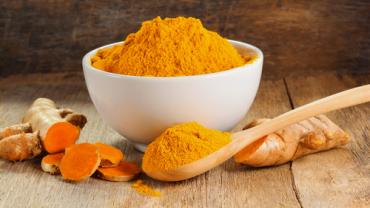
There are only a few natural products that have demonstrated as wide a range of protective properties as curcumin. Turmeric has three main bioactive components: curcumin, desmethoxycurcumin and bisdemethoxycurcumin. These curcuminoids have many biological effects including anti-inflammatory, antioxidant, antitumor, antibacterial, and antiviral properties.
According to a new study published last Friday in Metabolism, researchers demonstrated that the addition of curcumin to phytosterol supplementation provides enhanced cholesterol-lowering effects greater than taking phystosterols alone.
This study consisted of 70 patients with dyslipidemia. Each individual received either a placebo, 2 grams of phytosterols, 200 mg of curcumin, or a combination of 2 grams of phytosterols and 200 mg of curcumin daily for four weeks. Laboratory assessments included fasting total cholesterol, LDL cholesterol, HDL cholesterol, and triglycerides. Anthropometrics and fasting blood glucose were also evaluated.
As a result, phytosterols as well as phystosterols combined with curcumin supplementation both significantly lowered total cholesterol, LDL cholesterol, and total cholesterol/HDL ratio. There was a reduction of 4.8% in total cholesterol and 8.1 in LDL cholesterol in the phytosterol group. The curcumin only had minimal reductions in total cholesterol and LDL cholesterol of 2.3% and 2.6%; however, the combination therapy had the greatest reduction in total cholesterol of 11.0% and LDL cholesterol of 14.4%. This reduction was significantly greater compared to those alone. HDL cholesterol and triglyceride concentrations were not affected.
Previous studies have demonstrated that curcumin promotes changes in the expression of genes involved in cholesterol synthesis such as the LDL receptor mRNA, HMG CoA reductase, SREBP, cholesterol 7 alpha hydrolyze, PPAR, and LXR1.1,2 One human study demonstrated that 500 mg of curcumin per day increased HDL cholesterol by 29% and reduced total cholesterol by 12%.2
In addition, I shared a study last year in Complementary Therapies in Medicine (published in August) on curcumin and dyspildemia in diabetic patients. In this study, researchers demonstrated that curcuminoid supplementation of 1000 mg daily for 12 weeks can reduce lipoprotein(a) and increase HDL-C.
Health care providers have many tools today to assess cardiovascular health and support the body’s physiology. It is essential to perform a thorough assessment for these patients. This may include looking at lipid fractionation profiles, chronic inflammatory markers (ferritin, hs-CRP, fibrinogen), nutrient markers (magnesium, potassium, selenium, copper, folate, B12, B6, zinc, and calcium), fat soluble vitamins (vitamins A, D, E and K, and CoQ10), oxidative stress factors (homocysteine, insulin, and lipid peroxidases), heavy metals, and fatty acid profiles. A successful treatment approach should include investigation into these factors.
By Michael Jurgelewicz, DC, DACBN, DCBCN, CNS
Additional Sources